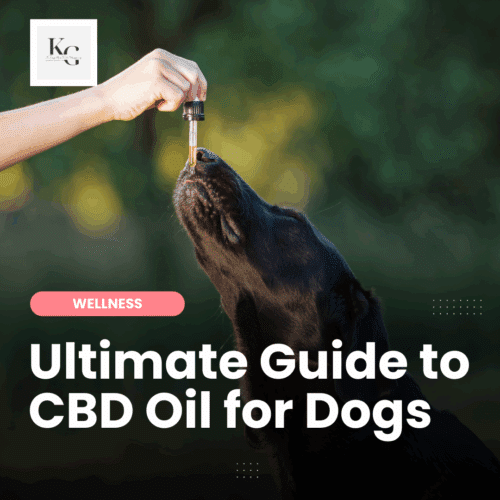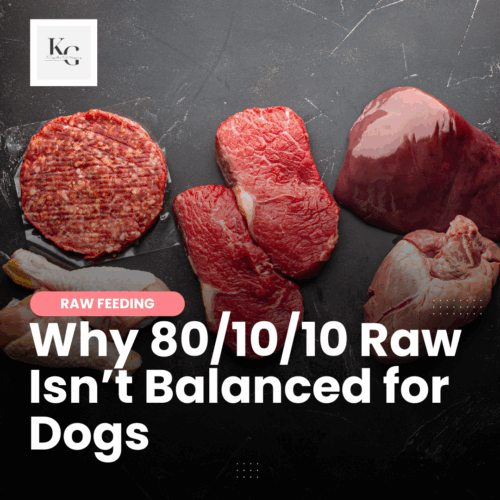Keep the Tail Wagging is supported by pet parents. I occasionally earn a commission (at no additional cost to you) when you click through an affiliate link to one of my favorite products. Thank you for your support. Read More
In 2020, a popular dog health and nutrition website filed a lawsuit against CocoTherapy, a small, family-run business that promotes coconut oil for pets. When I read the news, I was stunned. Dogs Naturally Magazine has been a big part of my journey as a raw feeder, pet parent, and dog nutrition blogger. They hosted a guest post from me about canine digestive health – it was the highlight of that year. And you're hard-pressed to Google anything about natural dog health without seeing an article by Dogs Naturally Magazine high in the results.
And CocoTherapy is a beloved company. Sisters, Carmina Figueroa O'Connor and Charisa Figueroa Antigua, are passionate and well-educated on the topic of coconut oil for pets. I would call them experts on the topic, and I've learned a lot from them, especially during their session at the 2018 Raw and Natural Dog Summit, hosted by Dogs Naturally Magazine.
And now a media giant filed a libel lawsuit against a family business after an online back and forth on the topic of coconut oil, affectionately called CocoGate. You can read the details of the lawsuit here.
This story goes beyond the benefits of coconut oil for dogs. I was now wondering if sharing if I could be at risk if I shared an alternate opinion in an article.
If you're stuck on a blog post idea, consider responding to another blogger's article:
- You can agree with the blogger, adding your experience to support your agreement.
- You can write a post that disagrees with the blogger, adding your experience and other information to support why you don’t agree.
I used to do this all the time. But now, I’m thinking twice before hitting publish.
I’m not a stranger to being threatened with a lawsuit. It’s happened several times because people don’t like it when someone doesn’t like their product or book, or they're called out publicly for bad behavior. Although I try to be balanced and thorough in my reviews, no one likes a negative review or feedback. I sure don’t.
But can someone sue me because of a negative review if all of my statements are honest?
What is Freedom of Speech?
Let’s start from the beginning. Regarding blogging, there is a question of whether bloggers are considered journalists and awarded the same protections. It depends on the case law that you're citing (based on my limited research), but regardless of if I am considered a journalist or not, I still have to watch what I say (or publish). I can say whatever I want and call it “my opinion,” however, if this is done with malice, I could open myself up to litigation.
One thing I see mentioned on social media is “Freedom of Speech,” and I wonder if people really know what that means.
According to Merriam-Webster Dictionary, Freedom of Speech is “the right to express information, ideas, and opinions free of government restrictions based on content and subject only to reasonable limitations (as the power of the government to avoid a clear and present danger) especially as guaranteed by the First and Fourteenth Amendments to the U.S. Constitution.” Someone not liking a blog post or social media status update doesn’t mean that my ‘freedom of speech’ is being infringed upon. It just means that someone doesn’t share my opinions. That’s called life.
Based on this definition, the government cannot come in and shut down my blog because I passionately state that I prefer raw to kibble for my dogs. However, if that statement came with the launch codes of nuclear missiles or the identities of undercover operatives in other countries, the government would pull the plug on my website. They’d also toss me in jail.
Get the difference?
When is Sharing an Opinion Liable?
We share our opinions all day, every day, on social media. I bet you've never thought of someone sending you a cease and desist letter or taking you to court. Of course, I knew this was a possibility, but I only thought I was at risk if I lied about a person, brand, or product.
Libel vs. Slander
According to Google, libel is “a published false statement that is damaging to a person's reputation; a written defamation.” Libel is written, and slander is spoken. There are two parts to libel, as I understand it. Someone must prove that I lied in a blog post and that the lie negatively impacted their reputation/business.
An example of libel is “Kimberly will promote anything if you pay her enough.” This is a false statement, and depending on who says this and where this statement can be very damaging to my reputation. For example, if a dog owner who doesn't like me makes a negative comment, it won't impact my reputation. However, if a respected celebrity makes this statement, it will impact my reputation.
What is Trade Libel?
A friend told me that there is another type of libel accusation: trade libel. Trade libel is the act of publishing a false statement as fact (sounds like libel to me) intending to disparage the quality of a business's products and services, which results in financial damages (loss of sales). So, trade libel sounds just like libel. But then I kept reading. What I needed to learn was the difference between libel and defamation.
Commercial Defamation: includes statements (written or spoken) that call into question someone's (or a company's) character by suggesting, for example, that someone is dishonest, corrupt, or not qualified to do a job.
Trade Libel: this is similar to commercial defamation, except instead of attacking a company or an individual, the attack is on the quality of a company's products or services. What's scary about trade libel is that consumers (you and me) can also be sued for this. Have you ever left a passionate, angry review? Do you have evidence to support your review?
So, Can I Be Sued for Sharing an Opinion or Experience?
Absolutely! I can be sued for wearing white after Labor Day if someone has the funds and can find an attorney to take on the case. It turns out that being sued isn't the question.
[A]nyone can be sued, at anytime, for just about any reason. The real questions are really: (1) whether someone is likely to either (a) have the money and desire to pay a lawyer the significant amount of money it costs to handle a lawsuit (which regularly cost tens or even hundreds of thousands of dollars) or (b) could likely find a lawyer to work on a contingency basis, which means the lawyer accepts the case without payment, in exchange for a percentage of the recovery at the end of the lawsuit.
Tina Willis, an Orlando personal injury lawyer and owner of Tina Willis Law
Yes, anytime you write something on your blog that the subject of the article disagrees with, there’s a possibility they may file a lawsuit for libel. In America, it’s easy to file a lawsuit. In this context, all that person would need to allege is that you stated an untruthful fact about them on your blog, which resulted in damages. Your defense, of course, would be that your statement was factual. And if you’re correct, you’d eventually win. But you’d have to pay the legal costs of defending the lawsuit.
So, even if you’re only writing truthfully, you risk being sued.
What's the Risk of Being Sued for Libel?
As I was reading about the lawsuit between Dogs Naturally Magazine and CocoTherapy, I tried not to personalize what I was reading, but I'll be honest – I was freaking the EFF out because this is really happening. I began thinking of less-than-positive blog posts I've written – yes, they were honest (and balanced), but what if one of those brands decided to sue me for damages? Can I afford to fight a lawsuit, even if the Plaintiff doesn't have a case? Yeah, the answer to that question is NO! Hell No! Absolutely NOT! Hiring an attorney to respond to the lawsuit would cost thousands of dollars I don't have.
But, let's be honest, what's the risk of being sued?
[M]ost people and businesses who have the money to hire a lawyer are not likely to do so if they are going to have to pay tens of thousands of dollars, yet aren't likely to recover any money at the end. Some people may hire their own lawyers to threaten a lawsuit — which is a whole lot less expensive than actually following through on that threat by paying lawyers to file and handle a lawsuit, from beginning to end. This means, at most, the lawyer might write a demand letter, in an attempt to scare the person on the receiving end into compliance.
[P]roving a libel case is not easy, even if the damages are clear, because truth is a defense. There is a lot of complex law that goes into deciding what constitutes “truth” in a libel case. But an honest review, let's say regarding your experiences using a product, is highly unlikely to constitute a successful libel case. Truth is a defense. An opinion is also safe from libel, but what constitutes an opinion is subject to a lot of debate in the cases. Just saying “in my opinion” will not protect someone if they make a factually untrue statement.
Any false statement must also damage the plaintiff's reputation. And these damages must be clear, like definable lost profits. Again, if the damages aren't significant, the person or company will not be able to find a lawyer to take a case on contingency, which eliminates almost all real lawsuit concerns. In other words, there is no value in a case where you harmed someone's reputation, but they can't prove that it cost them a certain number of sales or customers.
Tina Willis, an Orlando personal injury lawyer and owner of Tina Willis Law
Can Someone Win a Libel Lawsuit Against a Blogger?
What are someone's chances of winning a libel lawsuit against me? How does a company prove that my blog post impacted their sales? Do they host a poll and ask people why they're NOT shopping on their website? How can they determine that a decrease in sales is because of one random blogger?
Tom Nowland, an attorney in Southern California and owner of Nowland Law, who represents businesses in litigation, says that for me to defeat a lawsuit for libel, the following needs to be taken into consideration:
- Did the blogger express their opinion, or just make up false or demonstrably untrue statements about the product/company? If you were to say, “I personally would not let my baby play with this product, I think it is dangerous,” then you are standing on solid legal ground. If you were to post, “this product kills babies” without any proof, then you are probably going to get sued and lose for defamation.
- Did you contract to only say positive things about the product? Often, bloggers will take ‘influencer contracts’ to do an advertising editorial. If your contract states that you should only say positive statements about the product, and you break that, the company might have grounds for pursuing breach of contract.
- If the lawsuit was from a reader/government agency about not stating you were paid or compensated by the company. Current FCC rules require bloggers who are being compensated with anything of value by a company, to clearly state such in a prominent way. Social proof really does have a powerful effect on consumers. Ethicists and the law agree; if you’re going to get compensated for giving rosy social proof to a product, you should be upfront about that.
Reading these guidelines makes me feel more secure about what I've published so far, but recent events will definitely change how I approach blogging in the future.
Protecting My Blog
The lawsuit filed by Dogs Naturally Magazine gave me pause, and I have concluded that I need to make some changes to how I run my business because I want to make sure that I don't wake up to a stranger trespassing on my property gleefully waiting to say the words “you've been served.”
No More Sponsored Posts? – I am often paid to write sponsored posts, which are a series of blog posts written to promote a brand or product. The amount of time and work that goes into writing a series is astounding and goes beyond writing 1,500 words and hitting publish. I do research, writing, editing, search engine optimization, and social media promotion for each post. It's a lot of time, so I charge for the work.
No More Unsolicited Reviews? – I don't often accept reviews, but sometimes someone will offer to send me something that I've always been curious about, or I find exciting, and I'll accept the review. Over the past few years, I've started buying the products myself. I can be 100% honest in my reviews because, since I purchased the product, there isn't an assumption that my review will be positive.
Don't Post in Anger! – There are times when a brand or an individual pisses me off so much that I turn on my MacBook and start typing feverously as I purge my anger and frustration in a blog post. I've done this many times over the years, and I've learned to get the words out and then save the post as a draft to finish another day. Once I cool down, I can see the experience with clearer eyes, and I either rewrite the blog post, telling a more balanced story, or I delete it completely. It's not a good idea to allow my first reaction to reach Google.
Take Screen Captures of Everything! – I take screenshots as protection against liars. Whenever I have a discussion that is going south, I screenshot the entire exchange and save the images in a folder. Most of the time, I never have to use it, but there have been times when a brand has come back and accused me of something, and I had the discussion to prove that they were wrong.
No Guests Posts! Ever! – I stopped accepting guest posts, with the rare exceptions. I can't take the chance that I may have to pay for something someone else says in a blog post. I can edit the post carefully to ensure this isn't the case, but I don't want the extra work.
If you're a blogger, please don't feel you can't be honest and share your opinion. Sadly, we live in a time when we can't trust many people, and pet parents count on bloggers for our honesty. Unlike brands, we are raising pets right alongside our readers so they can talk to us about anything pet-related, and we can share our experience. So don't stop blogging. Just take care when you are blogging.



















Thank you for an informative post! I’ve learned a lot!
This is heartbreaking. A typical David & Goliath scenario. DNM are bullies. I love CocoTherapy and so do my customers. DNM started this war. Cocotherapy was just defending themselves. So why is DNM suing them? To me this is just a case of ego and revenge. This is a sad day for pet parents that just want the truth.
I disagree with you!
Just kidding. I have worried about this myself and seldom allow guest posts or do sponsored posts anymore because of it.
I’m thinking I should switch from a sole proprietor to an LLC to protect myself too.
I like how you explained expressing your opinion but not stating it as facts. I’ll remember that.
WOW! That was enlightening. I too do not accept guest posts – never have for the very same reason you mention in this post. It’s too risky – that and the fact my readers want to hear from me! I have in the past received a product, tried it, didn’t like it and called to tell the company rep – I cannot in good conscience write a favorable review. I then ask them what they would like for me to do and I sit on the phone waiting those uncomfortable 30 seconds. No one has ever asked for me to return the product. No one has ever asked me to pay for it, we just agreed mutually that in everyone’s best interest we just accept that this product isn’t a good fit for my Boys and we never talk again. This eliminates me from writing something negative which could result in some stranger walking up to my door trying to serve me papers. Great post Kimberly, I am so sorry to hear this about CocoTherapy. I sure hope they are able to work this out intimately…. Take care and thanks so much for sharing,